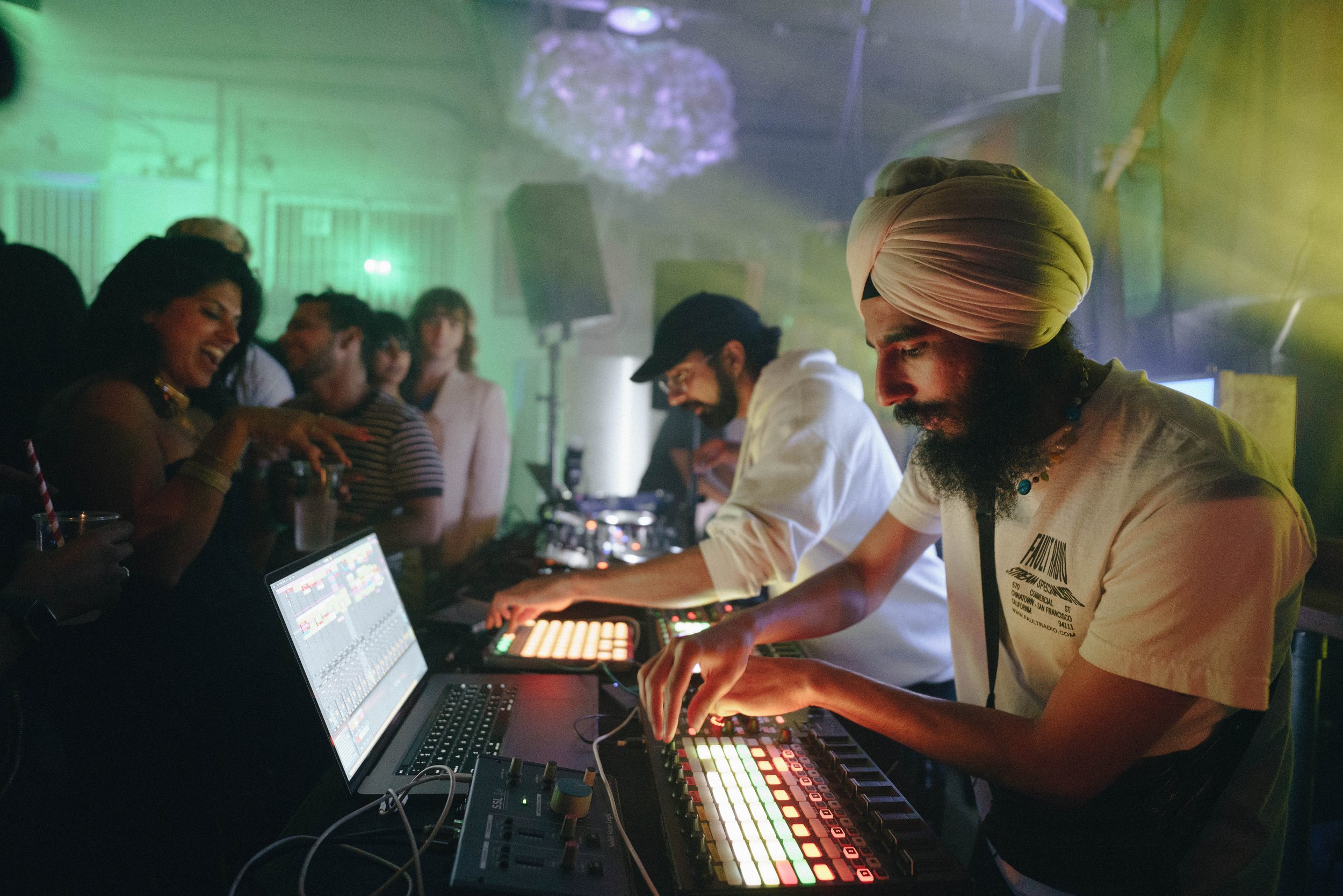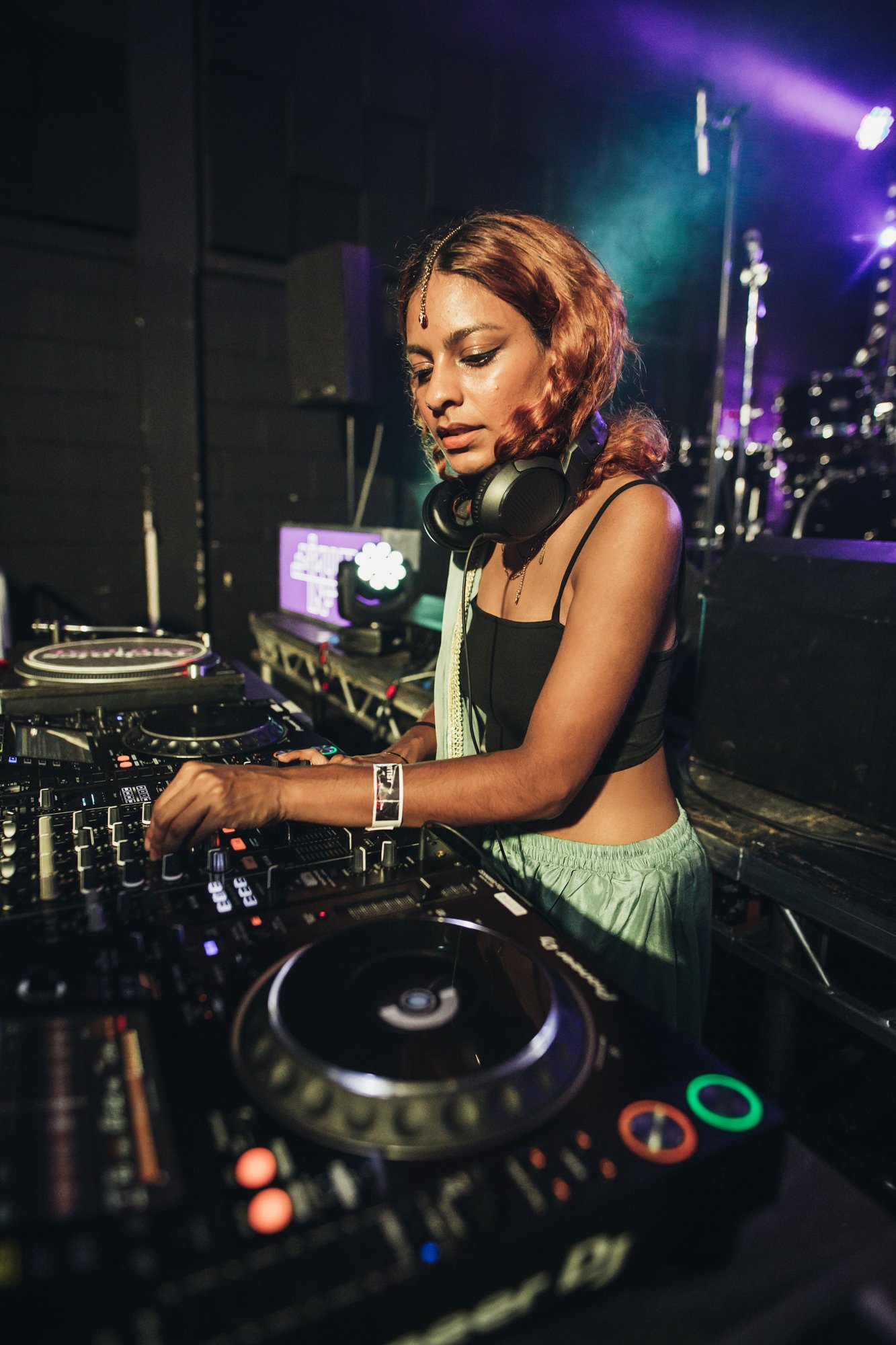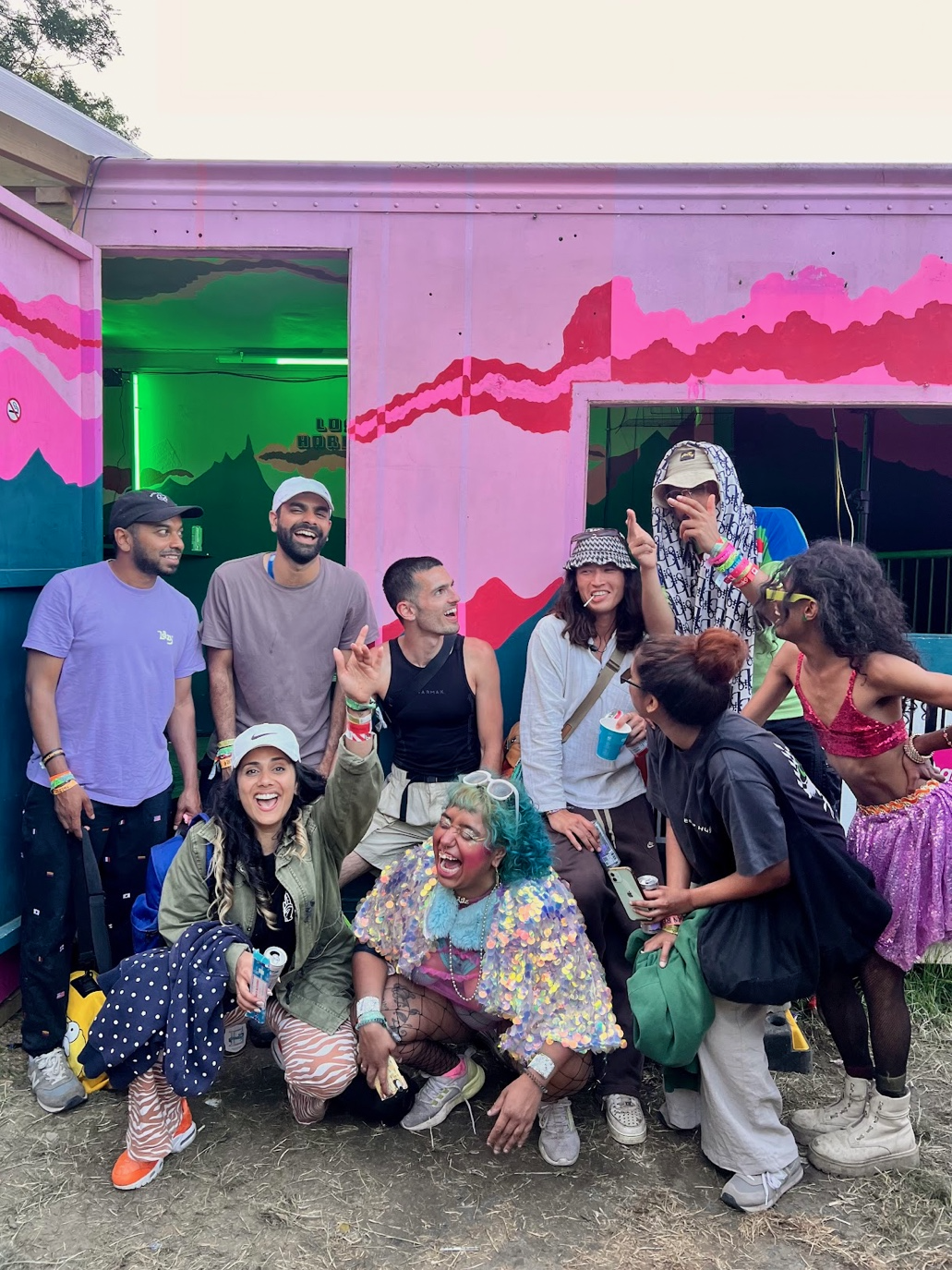Family Reunions for a New Era: The South Asian Underground Takes Glastonbury and Beyond
‘Family’ is a big word, and especially in South Asian cultures, it can be a particularly complex and loaded word at that. It’s no secret that ethnic minorities can often have a paradoxical relationship with what ‘family’ means - ‘blood is thicker than water’ might as well be on a banner at every dysfunctional family reunion. Ironically, this idea is juxtaposed to the fact that quite literally every brown family friend, neighbour, or postman can be considered a relative in some capacity, out of respect. And just like that, the family tree becomes a family forest. This new era of ‘family’ however, validates the idea of ‘choosing your own family’ on the basis of who adds value to your life; whether it be relatives by blood, close friends or the same faces you always bump into at every South Asian event (AKA: the reunions).
The South Asian underground has had what feels like a resurgence of sorts in recent times - with our culture being put front and centre of our screens, radios and even minds (thanks for that intergenerational trauma xoxo). Although, I think we can unanimously agree that Panjabi MC will forever be etched in our ears and cause sheer, eye-widening excitement whenever the opening twangy riff hits the airwaves, no matter the year - ain’t that right Pharell?!
This look into the current ‘Brown Renaissance’, to quote Brown girl doing it too Poppy Jay, featured heavily during Pilot’s recent trip to Glastonbury festival. Now I can’t take you back in time with me to have a frozen marg at the Pyramid stage, as much as I’d love to, but I’ve got the next best thing, the stories!!!!!! So grab a fro-marg or a mango lassi and get comfy!!!!!
⌿
REPRESENTATION
Being given opportunities to show up in spaces where you typically haven’t been seenBefore we even set off for Glastonbury, my Spi-desi senses were tingling when I caught wind of a cheeky DialledIn (South Asian music + culture organisation) secret set popping up all over my IG. This felt MAJOR. I’d been spotting the same 6 people at South Asian events in London for months and was stoked for another opportunity to make new connections. En route to the fest now, and none other than infamous Desi DJ Bobby Friction dons the feed with an invite more enticing than my 6th consecutive Indian wedding invite of the year:
SOUTH ASIAN MEETUP GLASTONBURY 2023
BY THE RIBBON TOWER IN THE PARK
Friday 23rd 2 till 3pm
Meet your brothers and sisters for a chill, chat & for change
Now at the fest, Bobby Friction dressed as the Desi devil, was a vision in red and as soon as I approached the small circle of 5, embraced me as part of the family as did everyone else. The steady stream of South Asians rolled in and the chats started flowing - The mix of ages, members of the diaspora, and Glasto noobs/veterans gave way to some special conversations. What was immediately apparent was the warm energy and excitement from the group at being in a space full of their peers where connection was encouraged.
British Asians were weaved throughout Glastonbury from the festival goers, to the performers, to the staff - It was so special to feel the energy and see the joy that we brought and got from this iconic festival. After speaking to Vinay (age 75), whose first Glasto was back in 1984, and Mr.Friction, who first graced the festival stage in 1998, it became apparent that this wasn’t always somewhere you could find us. Although the board of attendees seems to have become more diverse in recent years, there is still a noticeable difference in the racial ratios present at the festival; which made the meet-up even more of a sacred space for the 20-25 of us that gathered together. The mic-drop moment that stuck with me from Vinay confirms that he is, in fact, the coolest uncle [by proxy] I’ve ever known: “We’re as rare as Pokemon in Pokemon Go, so when you see each other, look after each other” - I’ve never been so humbled to be compared to a Pikachu, but I’ll bloody take it.
Bobby spoke about spotting 5 Desi’s in his entire 7 days, 900 acres, and countless stages his first time at Glastonbury. When chatting about what inspired the *first ever South Asian Glasto meetup* he said that “at Glastonbury, [feeling safe and comfortable] is what it’s about - It’s about going ‘I’m with all these strangers communing with my fellow citizens and I love you, but I just want some family time at least once a day’”. Getting candid about race for a second (unclench your jaw, this is a safe space), it was clear, from chatting with my Glasto-surrogate family, that there was a mental block for some of us in this environment, a block that we didn’t even notice until coming together with our own kin. When you’re in spaces that aren’t typically designed for you it can require extra effort, that we don’t even register, to get through the day - But being amongst your own ‘tribe’ can be the most recharging and refreshing feeling. The mask comes down before we even know it’s on. This was a truly special and noble effort from Bobby Friction to unite us brown Pokemon in such an organic way - A wonderful ‘family-time’ moment was surely had by every Desi-festi-goer who attended (keeping our eyes peeled for next year ).
I also had the chance to catch up with the lovely and infinitely cool Almass Badat and Esha Sikander from DialledIn, while sat under the sweltering Somerset sun on day 5 of Glasto madness. Urban spaces designer and DialledIn DJ, Esha, spoke on the reality of spatial inequality today:
“Spatial injustice is very real, and we feel that as people of colour [ ] in the UK. The more that we can get ourselves to curate these spaces that have not predominantly been for us, the more they will open themselves up to us, and we can also be more a part of the really incredible UK + international artistry that goes on at Glastonbury. It’s a pretty fucking huge festival, so for us to be able to just have a hand in that, is progress to me.”
To echo Esha’s point of how South Asians are being given the opportunity to occupy space within the cultural tapestry of somewhere like Glastonbury, progress is being made and it was clear from the conversations I had at the meet up, that the group held immense, tangible pride in spotting South Asian names on the line-up. “It's nice to hear the music that you grew up listening to, that your parents grew up listening to, it makes you feel like you’re supposed to be here, almost”, said newlyweds Jaipreet and Taz. They touch on the importance of the relatability that comes from representation and how hearing an old Bhangra banger in an unfamiliar space can physically and mentally make you feel at home; like sinking into a grandparent’s worn-out armchair.
CELEBRATION
Creating your own spaces for you, by you“We’ve never explored, we’ve never had the chance to explore [ ], we’ve been busy migrating, surviving, adapting and being resilient, but really part of that resilience and that adaptation is allowing yourself to be creative”.
Esha spotlights the tougher circumstances that were met by our older generations who came to the UK as immigrants and were wired to survive, blend in and adapt. The reason for their coming to the UK, often being in search of a better life for their family; with that ‘better life’ most times consisting of being expected to uptake 1 of 3 high paying and stable jobs in the name of providing and building, so that surviving may become less of a hardship. With creativity barely scratching the surface of a second thought as a hobby, much less as a career.
Further describing the (mostly) outdated views of the South Asian diaspora: “We’re always sidelined, we’re always seen as engineers and lawyers and doctors - And I think, right now, what’s beautiful is that the tide is changing”, podcaster Poppy Jay recognises the stunted growth of the South Asian creative community, but chimes in on how things are changing for today’s British Asians. We’re reclaiming the idea of a ‘better life’ as one that is happy, fulfilling, creative, colourful, and shaped by us. Echoing this, DialledIn Programmer, DJ and Marketing Lead Almass Badat affirms how today’s British Asians are living more for themselves and how DialledIn operates from “wanting people to have agency and autonomy over [the] self”.
Almass also touches on how, although we’ve recently been given the spotlight to express ourselves to the wider world, “South Asian artistry has existed way before anything like the BBC or Glasto [ ]. It’s in our veins to be expressive” hence it’s part of DialledIn’s mission to actively “give ourselves the chance to look at ourselves in a different light and to create space to platform and develop South Asian artistry”. And with that, the South Asian underground has grown to flourish up above.
As well as subverting the idea of what a happy and fulfilling life looks like for us as individuals through family, careers, interests, the newer generation of South Asians have also had a breakthrough when it comes to viewing their cultural identities through a new lens. Poppy Jay describes how
“For a long time, the South Asian diaspora, certainly in the UK, [ ] just didn’t feel like we were cool enough, like we had no cultural cache”, but now that we’re reclaiming parts of our heritage and our diaspora, we’re so different. We’re so many different communities, so many different languages, so many different musical influences and it’s coming together in this beautiful mashup and it’s so wonderful to see”.
In turn, public opinion on the South Asian diaspora is changing in a very open way, and can be seen through the incredible opportunities for representation in places such as Glastonbury (AKA: the humble breeding ground for this article, cheers Glasto x).
Boiling it down, “what is really cool, is us celebrating ourselves. If you celebrate yourselves people have to pay attention, so we do it for us, by us”, says Almass. She demonstrates the intrinsic ‘chicken and egg’ link between representation and celebration. One can’t happen without the other, and there’s no longer a clear sequence of events, especially since we’ve developed our own spaces independent of the wider societal programme - with DialledIn being a catalyst for the movement. From chatting with the wonderful Glasto ’family’ members on their experiences of being South Asian in today’s world, one stand-out mention was DialledIn. The group consensus of going to their events was feeling comfortable, seen and celebrated; which sets the foundation for this like minded community to become a ‘family’ of sorts. “When I first heard about DialledIn I saw this Instagram video with all these Asians dressed in Sarees and Kurtas all raving and I was like ‘I’ve been waiting for this all my life’” says Avi, another brown-brother by proxy, “You walk out of there and you’re so proud to be British Asian”.
EXPLORATION
Reimagining and recreating the culture and community as it suits today’s generationsOn DialledIn being a WIP, “spring-board” organisation that is ever-changing, growing, and learning how to be a space that celebrates and empowers South Asians, Almass leans into the explorative, “very very exciting” side of things when it comes to “taking the bits, the traditions and making them a version of it for ourselves”. She is keen to learn from our ancestors before, and tailor tradition for a new generation after, while keeping cultural throughlines intact. “Forming the culture in motion” was the standout phrase from Almass that perfectly encapsulated the current efforts and space building that we’re witnessing in the South Asian UK underground scene, with DialledIn at the helm of “recontextualising our culture and making it suit the current generation”, as Esha eloquently describes it.
Looking forward to the continuing development of DialledIn in today’s world, Esha reflects on her experiences living both in Pakistan and the UK growing up. Focusing in on the care and community values that can come from Desi backgrounds, which was juxtaposed with the UK’s emphasis on individualism and expression - and looking at the positives of both ideals. She speaks on how DialledIn works to “celebrate our intersection between the West and the East.
“We’re here now, we’re gonna be here now and generations are gonna be born here now. So how do we encourage them to be themselves and really fully embrace themselves while living in a context that wasn’t originally theirs?”
The South Asian culture being featured so heavily at Glasto and beyond is the product of the huge amount of self-celebration, self-belief and self-exploration that has come from the new wave of British Asians - undoubtedly pedalled by the impassioned pioneers from the generations that came before. This new generation of South Asians is redefining what ‘family’ means from the ground up, as well as picking and choosing which parts of our culture to willingly and openly embrace, and which parts to weed out for good. We’re growing the family tree from scratch, pulling out the toxic roots and nurturing it to flourish.
____
The heart of this investigation took shape completely organically with the power of the South Asian community being the driving force of all conversations and I am humbled, enlightened and honoured to have had these incredibly special conversations with these open and gracious people.
Quotes have been edited for length and clarity.
Photography Credits: Aiyush Pachnanda, Signature Brew, Sunny Formats







